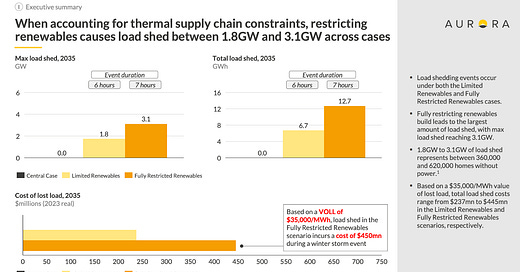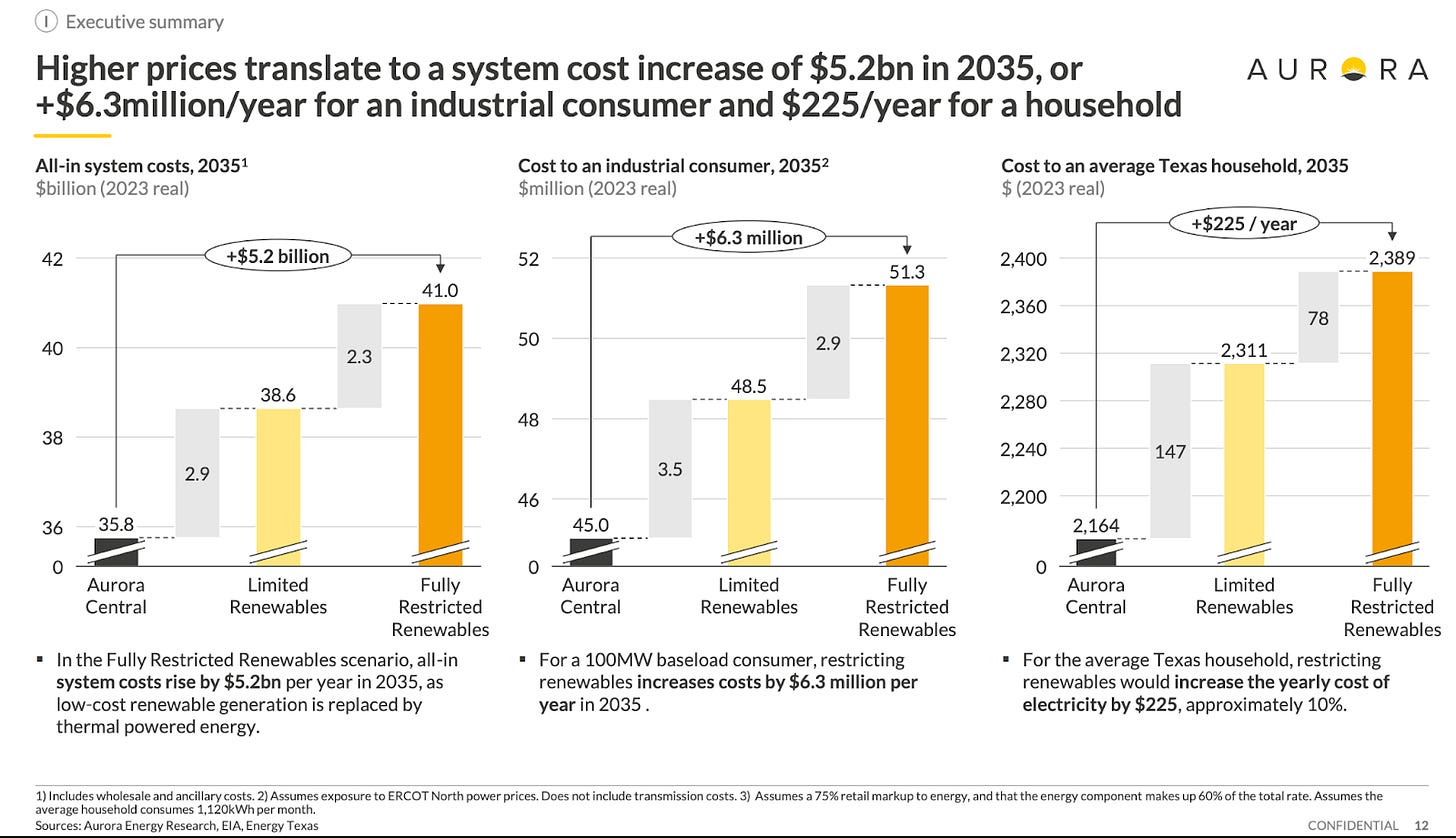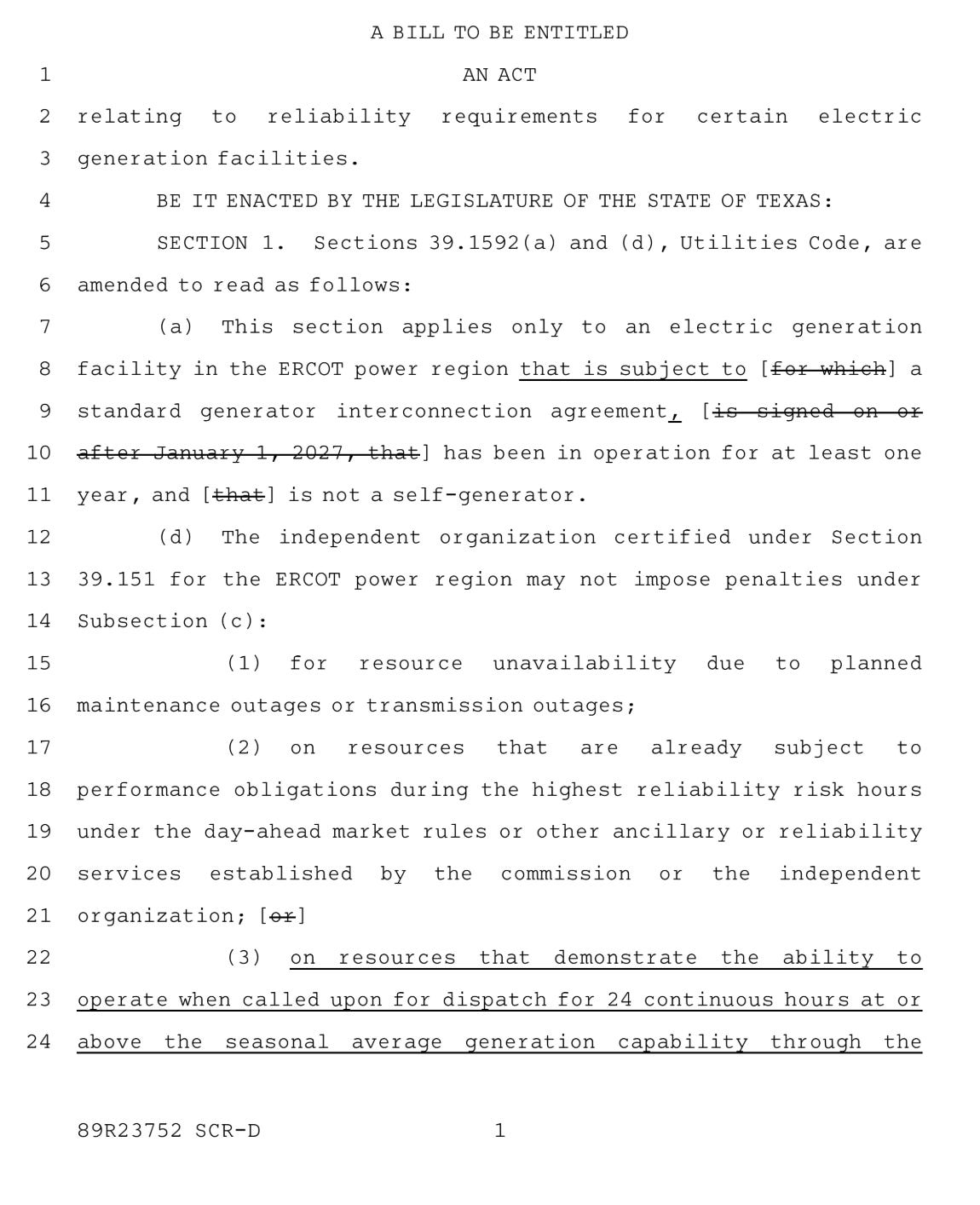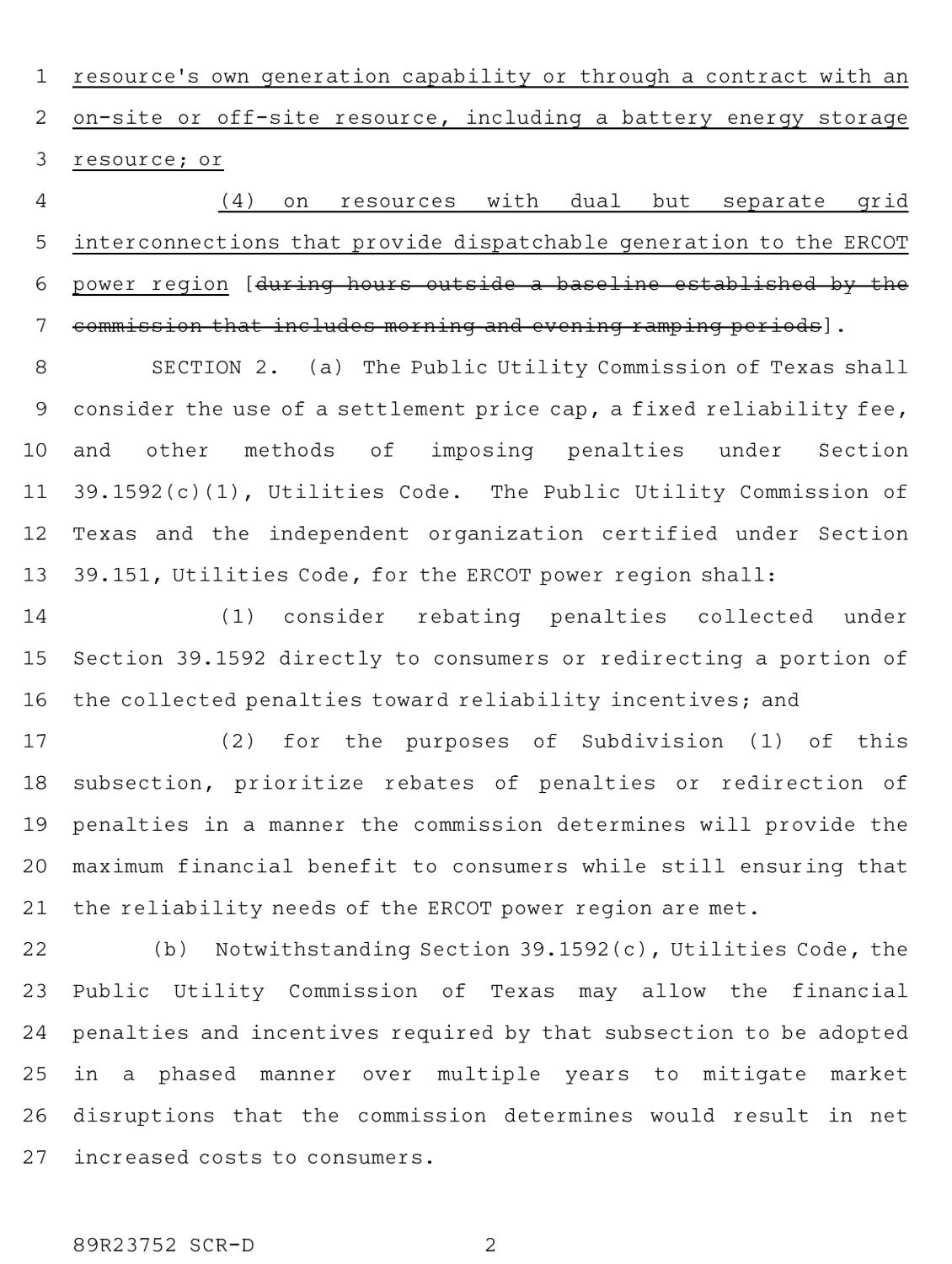Another Anti-Energy, Anti-Growth Bill Looms
ERCOT CEO said of a similar proposal to House Bill 3356 and Senate Bill 715 “we would lose energy resources” and face an “energy deficit,” which would raise costs: "everybody pays for that"
This session of the Texas Legislature features three especially dangerous anti-energy bills. Two of them, Senate Bill 819 and Senate Bill 388, have already cleared the Senate.
A third, perhaps even worse bill than the other two, Senate Bill 715, cleared committee on a close vote last week. It also has a twin in the Texas House of Representatives, House Bill 3356, which had a hearing last week and may come up for a vote in committee this week.
This massive threat to Texas’ energy growth — and thus to the entire Texas economy and the ERCOT grid — also has the most momentum.
HB 3356 and SB 715 would require renewables projects, including existing generating resources, to procure massive amounts of backup power at all times. Solar generators would have to secure enough battery or gas power to match their output at night — a time when no one expects them to produce energy and when demand is typically at its lowest anyway.
This would send the cost of electricity into the stratosphere. It also would transform the economics of existing projects so dramatically that some renewable generation would shut down and stop generating electricity. That would be catastrophic to an economy that’s projected to need far more energy to meet demand from data centers, manufacturers, oil and gas production, and others.
Powerful voices from all across the state – including Governor Abbott, ERCOT CEO Pablo Vegas, and Texas Association of Business President and CEO Glenn Hamer— keep emphasizing that Texas needs an “all-of-the-above” approach to energy.
Now more than ever, we need all the electricity it can get.
This legislation would give Texas much, much less.
A recent study by Aurora Energy Research, conducted for the Texas Association of Business, shows just how destructive this bill would be.
The study shows that the legislation restricting Texas renewables dramatically increases the risks of load-shed events, or rolling blackouts: over a million Texans would be likely to lose power each summer if these bills become law.
Equally troubling, power prices would increase $5.2 billion over the next decade — Texans would have to pay more for far less reliable energy. The increases would cost a Texas manufacturer over $6 million per year and the average residential consumer over $200 per year.
Killing the Solar that Texas Needs
These attacks come as solar power and batteries play an increasingly crucial role on the Texas grid.
Last year was the sixth hottest summer in Texas history, but there wasn't a single conservation alert. The summer before, by contrast, ERCOT called 11 conservation alerts and one energy emergency. The biggest difference? We had an extra seven gigawatts of solar and five gigawatts of batteries on the grid last summer.
PUC Chairman Thomas Gleeson said solar “saved us this summer,” referring to 2024, and that solar and storage “are key for reliability in this state… We need them to be successful.” Last summer, Texas had 25,000 megawatts worth of solar power on the grid — more than enough to power the entire Houston area. This summer, we’ll be at about 32,000 megawatts.
If HB 3356 or SB 715 passes, that number will go down, power bills will go up, and the power will likely go out for some period of time.
The Aurora study actually underplays the threat to reliability and costs, because it only looked at efforts to stymie future energy developments, not those that are on the ground now and subject to existing contracts. But HB 3356 and SB 715 target existing projects as well.
If this proposal becomes law, every single existing wind and solar project in the state would be required to have round-the-clock backup power — passing the costs of this needless, pointless, very pricey regulation on to consumers.
When a similar proposal was floated in the 2023 session, ERCOT CEO Pablo Vegas testified it would create “an energy valley … meaning we would lose energy resources in the short term.” He added that the bill would create a “cost burden” that forces generators to “pull out of the market, so we would have an energy deficit from that.”
He added that remaining generators would raise their prices: “That would then raise the cost in the energy market and everybody pays for that.”
The bill itself acknowledges this, giving PUC some discretion on implementing the rules due to “market disruptions” and “increased costs to customers” (text of the committee substitute to S.B. 715 is not yet posted online, but you can find it below, see page 2, lines 25-27).
Here’s an idea: how about we just choose not to disrupt the market and increase costs for consumers to begin with?
Reneging on an agreement made just last session
The bill also throws out a hard-earned compromise reached only two years ago by legislative leaders in both chambers.
Readers of this newsletter will remember that amidst the drama at the very end of the 2023 legislative session, legislators passed a so-called firming requirement — any electric generation project planned for 2027 or beyond will have to have some backup generation.
However, that requirement has an effective date of January 1, 2027, giving market participants time to prepare for this significant change. The requirement also applies to all forms of generation, not just renewables, to secure backup power, which makes sense given the difficulties thermal generators have had staying on during extreme weather.
But HB 3356 and SB 715 openly and actively discriminate against renewables — that’s the point of the legislation: to pour extra costs onto renewables, but not coal or gas plants which have also struggled with reliability.
Grid reliability, affordable power, and the Texas economic miracle would all be collateral damage of this discriminatory — and unnecessary — legislation.
The Market Doesn’t Need This
If SB 715 and HB 3356 supporters want new natural gas plants, there are better ways. As we enter a period of faster load growth, the market, far more than government intervention, will bring new gas generation (and nuclear and geothermal) online. ERCOT CEO Pablo Vegas just told the House Committee on State Affairs two weeks ago that the current market structure is “well-suited” to handle load growth from industrial electrification and data centers.
Big users coming to Texas are signing bilateral contracts to bring new resources, Vegas said, including gas plants and batteries. The market, in other words, is incentivizing the new dispatchable resources policymakers say they want.
New loads with power purchase agreements and demand flexibility can make the grid more reliable. If a market could be created for demand flexibility, just reducing data center load for one percent of their total annual usage would free up 15 gigawatts of extra capacity.
But SB 715 and HB 3356 supporters (and SB 819 and SB 388) don't really believe in markets. They'd rather use government bureaucracies and regulations to determine where and how Texans and Texas businesses get their electricity — and how much they have to pay for it.
They’d fit right in in California.
The problem is that some legislators think there are good electrons and bad electrons, and they’re willing to jack up energy costs and harm the grid to feed their ideological agenda.
There are a million ways to improve grid reliability — I’ve written about most of them in this newsletter. Passing anti-energy, anti-growth bills does the opposite.
Hopefully cooler heads will prevail, and the legislature will step back from the ledge that some members want to hurl the Texas economy off of.
Thank you for reading. This was a free post. If you’re already a paid subscriber, thank you. If you’re not, please become one today to get full access to the archives, Grid Roundups, access to chats and special presentations, and select episodes of the Energy Capital Podcast. If you can’t afford a subscription, you can request a complimentary subscription in an email to stoicenergyconsulting@gmail.com.
Below is the Committee Substitute to SB 715:








Someone save me, please. I am 73 and fear I may go to my grave not understanding something that should be as clear as anything could be. Given an hour of classroom time I could explain to a class of Middle School students, the lunacy of S.B. 819, S.B. 388, S.B.715 and H.B 3356, and they’d get it. If Middle School kids could get it, what’s with the Texas Legislature? How can, otherwise intelligent individuals, I assume most, or all college educated put their names on such bad legislation and pass the red-faced test? My question is; What is the motivation to be a Legislative Buffon? Is it blind adherence to misplaced ideology, compulsion the shine the boots of natural gas industry campaign donors, or not even the slightest inkling how the ERCOT electricity market works? What is it?
These attacks on energy generation, led by gov't regulation, don't square with the light touch Texas model.
I don't get it.